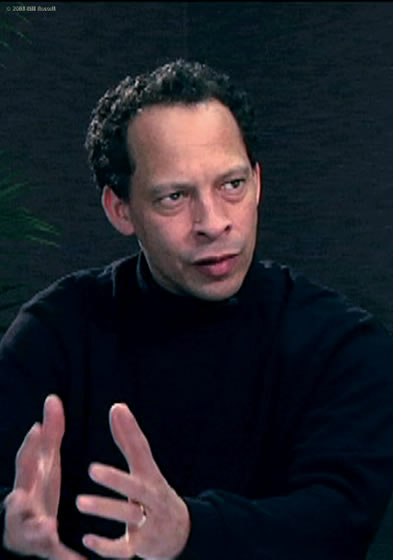 |
Lawrence Hill... writer. Mr. Hill’s novel Someone Knows My Name (published in Canada as The Book of Negroes) won the international competition for the prestigious 2008 Commonwealth Writer’s Prize. An African-Canadian author whose parents came from the U.S.A., Mr. Hill’s non-fiction includes Black Berry, Sweet Juice, a memoir of his black father and white mother, and The Deserter’s Tale focused on an Iraq War soldier. Mr. Hill is a reporter for the Globe and Mail in Toronto and Parliamentary correspondent for The Winnipeg Free Press, his film, Seeking Salvation: A History of the Black Church in Canada won the United States’ “Wilber Award” for best national television documentary. |
“Life, of course, is much more than just being a slave. There's everything that goes on in the life there and it’s hard to actually see the human being behind these huge titles. I want to bring the reader squarely into this world, and the corrosion of the soul, the toll the system (of slavery) extracts. Everybody caught up in it pays their own price, whether you're a slave or a slave owner or an abolitionist.
“I think that it’s really difficult for anyone -- particularly if you're a child or teenager -- it’s really difficult to visualize what a life might look like if you strip away the title ‘slavery’ or ‘slave’. I want to make the reader feel the time and the place and the heat and the cold and the pain and the shock of all these dislocations, actually see how people lived. What they felt like. How they ate, what they wore on their backs, how they bore their children. How they worked or what their parents were like. What relationships they had.”
So this award-winning African-Canadian created Aminata, an “everywoman” stolen from her family at age 11. He quickens her into a remarkable woman through whom he sums up the entire slave narrative in North America. Called Someone Knows My Name in the U.S., in Canada it’s The Book of Negroes in recognition of one of many essential elements that are true to history.
“The actual ‘Book of Negroes’ is 150 pages in length and contains the names of 3,000 African-Americans who are moving out of Manhattan (along with the British, defeated by their former colonists). It’s the first time that thousands of African-Americans are publicly, formally documented by any formal body in the United States or in Canada. And these people are moving primarily into Canada so it’s like a community passport.
“I dreamed Aminata into existence when I heard about the (subsequent) exodus of 1,200 African-Americans who were leaving Halifax and going to found the colony of Freetown in Sierra Leone in 1792. These are African-Americans who have become Afro-Canadians and are so disgruntled by their time in Canada that they leave what they thought was the promised land.
“Not only were 1,200 leaving, but a third of the adults on those ships had been born in Africa. Unbelievable!”
When pressed, Mr. Hill acknowledges a larger, timeless meditation underneath his riveting story.
“Identity and humanity are often submerged or lost or ignored or shoved under the mat or stomped on by dint of this horrible monster that was the transatlantic slave trade. And yet somehow people -- millions -- not only survived the rigors of this trade and this intercontinental dislocation, but they also survived emotionally. That emotional survival is what fascinated me.
“It is really a human miracle, that people can pass through the most indescribably painful moments and come out the other end being bigger. How do ordinary people who are caught up in extraordinary circumstances hang on and become richer people as a result of it ? How does that happen?”
[This Program was recorded March 24, 2008, in Charlotte, North Carolina, U.S.]
audio content:
 8:30 8:30 |
 19:27 19:27 |
 25:51 25:51 |
 5:09 5:09 |
 |
 |
 |
 |
